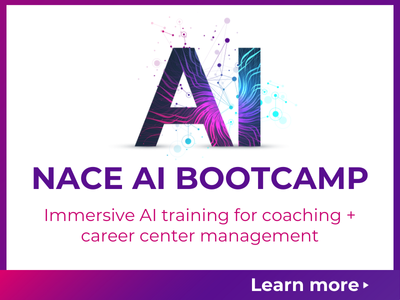Every year, NACE hosts their Management Leadership Institute (MLI), which is designed to help participants prepare for leadership roles. After giving some thought to attending this year’s session, I reached out to previous participants to learn about their involvement in this professional development opportunity. From these conversations, I sensed it would be an intense, weeklong training session with individuals who aspire to be leaders in the career services profession. After attending this year’s event, my assumptions were confirmed, and I was encouraged to view this as an invaluable, long-term investment at this stage in my career.
My Experience at NACE MLI 2022
Because many higher education leadership positions involve strategic financial planning and budget management, this was an area that MLI focused on. Ja’Net Glover, senior director for career services at the University of Florida, facilitated a four-hour session that elaborated on types of budgets, budget planning strategy, budget impact factors, types of budgeting approaches in higher education, revenues and expenses, funding sources, and restricted accounts and sponsored projects. The engaging, yet simple-to-understand content—even for the mathematically averse like me—combined with her oratory prowess and several group discussions made this topic both informative and fun. Glover emphasized the importance of planning ahead, being mindful of a variety of funding sources, i.e., internal, external, private, public, through donors, and so forth, and factors that will impact funds to ensure both accountability and success. A major takeaway for me was to consider ways I can influence the budgeting process in the short- and long-term when I am in this kind of position in the future.
In addition to financial matters, I was eager to learn from my colleagues about what they value in a leader; it was common for my colleagues to cite social and emotional intelligence and empathy as key attributes in a leader who was empowering and supportive. Silence, however, often ensued when I asked if they had seen any of these attributes with their current or previous leadership. Their reactions were not surprising to me, especially after coming across Jeffrey Pfeffer’s book, Leadership BS: Fixing Workplaces and Careers One Truth at a Time. Two surveys cited in his work echoed in my mind while at MLI: 1) people trust strangers more than their supervisor, and 2) people will forego a larger salary to have their current or direct supervisor removed or terminated.
Despite knowing what we want from leaders, the reality is grim in so many work environments. In higher education, however, I have noticed that leadership roles often require the incumbent to “wear multiple hats”—that is, to problem-solve, budget, and foster and sustain healthy office dynamics with numerous campus partners, all while articulating a clear focus, vision, and mission—but such positions are mostly occupied by faculty with years of extensive training in a narrow field; essentially, specialists are filling generalist roles, and this approach can impact everyone.
Morris and Laipple1 took a national survey from 1,515 administrators made up of academic deans, directors, associate deans, and department chairs that focused on their leadership skills, readiness for the role, and job fulfillment. Their results showed that developing entrepreneurial revenue, establishing metrics to document progress, and handling grievances and appeals were areas current administrators were least prepared for. Secondly, more than half the participants became indifferent about their work some time after accepting their positions.
Where to Go From Here?
The “specialist to generalist” approach can be complicated and nuanced and often has many extenuating factors in its extensive history. It is beyond the scope to adequately address them here; also, immediately pivoting away from it or employing alternatives quickly may not be feasible. What is practical, however, is having frequent conversations about leadership with all the critical stakeholders on campuses.
What are the prevalent and popular misconceptions and myths or positive and negative stereotypes about leadership? For example, certain titles, elite educational pedigree, or terminal degrees are not prerequisites for competent and effective leaders. Secondly, longevity is not synonymous with competence.
The recent mass resignation phenomenon has included higher education, and student support professionals2 are leaving their positions. Leaders need to clearly articulate a vision and a purpose and equip their team to employ policies, approaches, or models to achieve them that are equitable, sustainable, and directly (or indirectly) equally supportive of staff. Whether or not leadership can think of creative ways to incentivize retention—alongside additional compensation—remains to be seen, but my MLI participation confirmed that reimagining leadership and moving away from the many unsubstantiated claims about this topic will be a critical part of the process.
Endnotes
1 Morris, T. Laipple, J. (2015). How prepared are academic administrators? Leadership and Job Satisfaction within US Research Universities. Journal of Higher Education Policy and Management. Vol. 37, No. 2, 241-251.
2 Walton, M. (2022). Right now, Your Best Employees are Eyeing the Exists. The Chronicle of Higher Education. https://www.chronicle.com/article/how-to-keep-your-staff-from-leaving






